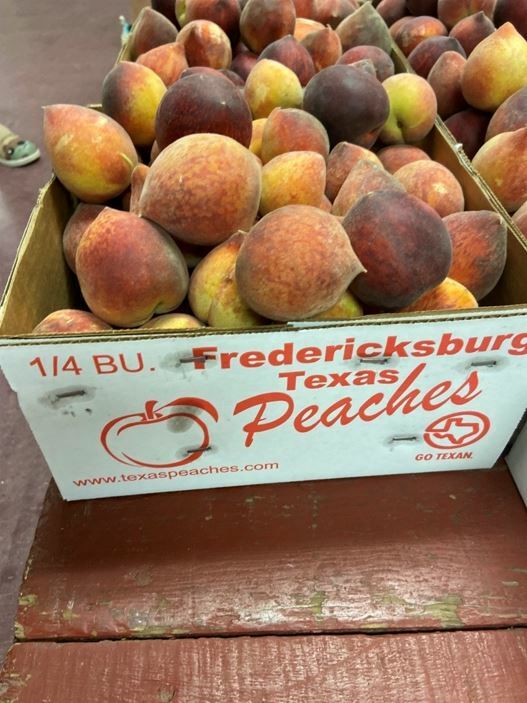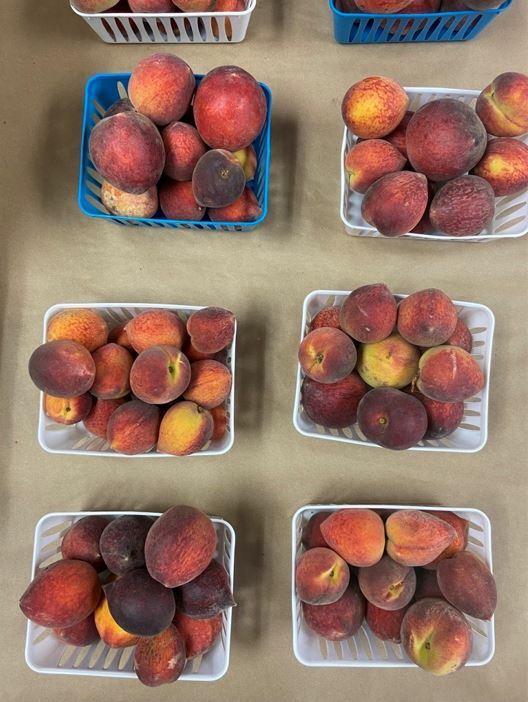 As a Georgia peach, with “Peachtree” in my childhood home address, I have been skeptical about Texas’s peaches. So, when we pulled up to Burg’s Corner, the retail site of Jimmy Duecker Orchards, a store right off Highway 290 East, I was planning on disappointment. Founded in 1948, the store was the hub of the co-op of peach farmers. The Duecker family bought the store in 1997, and the family grows 16 varieties of peaches. The store contains pickled vegetables, fruit jams and jellies, soaps, t-shirts, dressings, and condiments. But what is most noticeable in the whole store is the peach crop. The size of the peaches lent another reason to be a critic.
As a Georgia peach, with “Peachtree” in my childhood home address, I have been skeptical about Texas’s peaches. So, when we pulled up to Burg’s Corner, the retail site of Jimmy Duecker Orchards, a store right off Highway 290 East, I was planning on disappointment. Founded in 1948, the store was the hub of the co-op of peach farmers. The Duecker family bought the store in 1997, and the family grows 16 varieties of peaches. The store contains pickled vegetables, fruit jams and jellies, soaps, t-shirts, dressings, and condiments. But what is most noticeable in the whole store is the peach crop. The size of the peaches lent another reason to be a critic.
“Why are the peaches so small?” I asked one of the farmers, who had just handed my husband and me a slice of a peach to try.
“We’re in a drought,” he responded. In fact, he said, we’ve been in a drought on and off for the past 20 years. He described the pattern of a year or two of heavy rain only to then return to the drought. (Austin’s weather cycle has proven to be cyclical). The Dueckers had a difficult choice to make this year, either shake the peaches from the trees so the trees could survive, or hand water the peach trees to save them and the crop. So, they hand-watered millions of gallons of water to save the crop.
“Less water,” he went on to describe, “means smaller but also sweeter. I would say climate change [is a reason for the lack of water] but who knows. Maybe it’s a moving equator. But we’re just thankful to have a crop.” 
The cheer in his voice and smile on his face reinforced the thankfulness of having the peaches before us in boxes and woven baskets.
The famer’s story of hand-watering hundreds of peach trees to keep the crop alive quickly made me a fan of the peaches. So, we bought a little basket of them.
The peach stand on Highway 290 teaches a much bigger lesson. The left’s climate change activists want to push climate change as the primary issue we should deal with, but the Duecker family farmer shows what really matters to Americans. Whether the climate is changing rapidly or not, people need to feed their families. And 64% of Americans are currently living paycheck to paycheck because of the rising prices of gas, electricity, and foods. Every peach we may buy this summer comes from someone’s farm where they fight to protect their livelihoods in the face of rising gas and diesel prices, food inflation, and fertilizer supply and prices.
Because here’s the deal: diesel prices are up 70.27% in one year, fertilizer prices are up approximately 78% than in 2021, and food prices are up 8.3% from last year.
And now every family is having to prioritize certain commodities over others. So, regardless of the left’s

hysteria on climate change, Americans are most worried about feeding their families. And farmers are just thankful to have a crop. Our lawmakers need to remember that everyday trials consume our minds more than any hyperbolic cry for saving the climate. To stay relevant, lawmakers need to address our current problems. That means unleashing our domestic energy production for the sake of reliability and affordability, to get the prices down that are gouging our wallets. We need look no further than a once prospering country that has gone down the socialist path that the Biden Administration is leading us down: Venezuela. Economic prosperity and environmental leadership go hand in hand.
Now is the time to be relevant. Rising temperatures or not, what matters the most to Americans is living, and we cannot afford to live with Washington’s current policies and priorities.